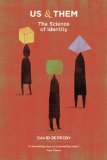Summary | Excerpt | Reviews | Beyond the Book | Readalikes | Genres & Themes | Author Bio

Critics' Opinion:
Readers' Opinion:
First Published:
Oct 2005, 384 pages
Paperback:
Oct 2008, 396 pages
 Book Reviewed by:
Book Reviewed by:
BookBrowse Review Team
Buy This Book
Why is all this variety possible? That's not a question that can be
answered by looking at the political, economic, or cultural aspects of
human kinds, as important as those aspects are. The issue is not what
human kinds are in the world, but what they are in the mind - not how we
tell Tamils and Seventh-Day Adventists and fans of Manchester United
from their fellow human beings, but why we want to.
After all, other creatures get along fine without dividing themselves
into such tribes. With one important exception, for instance, humanity's
close relative the chimpanzee goes through life quite well solving only
problems about Everychimp and problems about My Friend and Cousin, the
one with the long face and the limp - chimps in general and individuals.
Yet a human who went through life like that would not know what
"our kind" of food is, or enjoy "our kind" of music,
or know what "we do" when someone dies.
Such a person, lacking any sense of family tradition, religious
history, patriotism, or cultural pride, would not live a fully human
life. Human-kind thinking is an absolute requirement for being human.
Which brings up the dark side: people are killed for nothing more
than their membership in the "wrong" tribes. Many times in the
past few years, young men who were polite and thoughtful to members of
their own sort, who loved their mothers and listened to their fathers
and cared for their children, set out to kill other people's mothers and
fathers and children without a qualm - in New York City on September 11,
2001; in Beslan, Russia, on September 1, 2004; in Nazi-ruled Europe in
the 1930s and 1940s. More examples could fill every page of this book.
Throughout history, killers have worked with zeal because they believed
their victims were not of the same kind as the people they cared about,
the people who mattered. No wonder people both cherish and fear the
power of tribal thinking. No wonder they want to understand it.
Many people today find themselves struggling, again and again, with a
difficult question: Who is "our side"? In the days after the
September 11 attacks, the prime minister of Italy spoke of the
superiority of Christian civilization and was immediately denounced by
his allies; two religious leaders in the United States tried to claim
that abortionists and civil libertarians did not belong in the new
alliance against terror because they made God angry. The president of
the United States, though he was a political ally, rebuked the
clergymen. The new anti-terror coalition of nations could not make war on
Islam because they had millions of Muslim citizens. Was it, then, a
coalition of democracies? The most important frontline ally in the
ensuing war was Pakistan, a dictatorship. Obviously, sides in the current
conflict were chosen; they aren't a matter of "natural" or
inevitable divisions. Today it is clear as never before that human kinds
- those categories we use to explain human acts on every scale, from a
morning walk ("Why were those men wearing turbans?") to all of
history ("Is war inevitable?") - don't depend on what people
are, but on what people believe.
That's the difference between human tribes and the boundaries animals
observe. Many creatures, from mice and pigeons to lions and dolphins,
know a member of "our group" from a stranger. All these
creatures have been well studied in the past few decades, and the
pattern is clear: fights within the group are limited and tend not to
get out of hand, but fights between groups end in deaths. This in-group
restraint, as the psychiatrist and author Jonathan Shay has said, gave
rise to the widely believed myth that animals don't kill their own kind.
In fact many animals - lions, gorillas, chimpanzees, hyenas - are happy
to kill their own. The victim just can't be a member of their little
band.
Copyright © 2005 by David Berreby. No part of this book maybe reproduced without written permission from the publisher.





The Funeral Cryer by Wenyan Lu
Debut novelist Wenyan Lu brings us this witty yet profound story about one woman's midlife reawakening in contemporary rural China.
Your guide toexceptional books
BookBrowse seeks out and recommends the best in contemporary fiction and nonfiction—books that not only engage and entertain but also deepen our understanding of ourselves and the world around us.